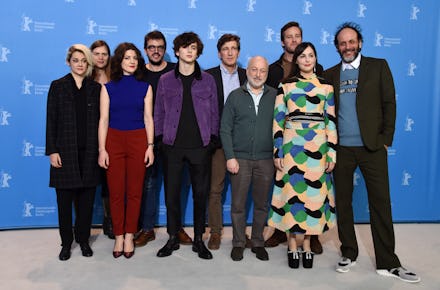Berlinale review: 'Call Me by Your Name' is a portrait of homosexual intimacy that honors the book

Call Me by Your Name, based on the 2007 novel of the same title by Andre Aciman, premiered at Sundance earlier this year, and played this week at the Berlinale to eager crowds.
Set "somewhere in northern Italy" in 1983, the story takes place at the estate of Professor Perlman and his wife, who host a graduate student as a research assistant each summer. Oliver, portrayed by Armie Hammer, is an American student who not only charms the Perlmans, but catches the eye of their 17-year-old son Elio, played by Timothée Chalamet. Hammer stretches the imagination playing a 20-something, particularly in contrast to Chalamet’s lithe, nearly hairless figure (he’s 21 playing 17 but looks even younger) — still, the physical chemistry between them is electric.
Adapting any novel into a film is a unique challenge, as it often leaves viewers and readers at odds, but director Luca Guadagnino’s film achieves much of the spirit that runs through Aciman’s novel. It may seem tautological to say so about a film based on a book, but Call Me by Your Name is an intensely literary film. The novel drips with the Western intellectual tradition, a fact the film neither loses sight of nor apologizes for — its dialogue is in three languages (in order of appearance: French, English and Italian), and its characters are as conversant in Hellenistic statuary and classical composers as they are 20th-century painting and 1980s pop music. The breadth of this story, from the rich art-historical imagery to the bookshelves' worth of literary reference behind every conversation, has not been diminished in its translation from book to film.
But the literary depth of Call Me by Your Name is set dressing to the soul of the story, which is the relationship between Elio and Oliver. Neither Aciman nor Guadagnino is openly queer — Aciman is married to a woman and Guadagnino has not publicly discussed his orientation — but each creates a tender portrait of a relationship between two men who cannot initially admit their affection, neither to one another nor to themselves. Both film and novel capture the unbearable privacy of closeted desire, which proceeds by degrees — a touch, a look, a certain preference that, by design, can be neither quantified nor directly confronted — the hesitant physicality between men who can’t be certain that the other won’t turn and run, or worse. When this tension finally breaks, the emotional and physical release of freedom — freedom to kiss, even simply to stare — is like finally breathing.
The delicacy of this dance is highlighted by interactions Oliver and Elio have with women, whom they pursue directly and forcefully — Elio in order to prove something, at least in part; Oliver perhaps out of a more genuine interest. Once Elio and Oliver finally kiss, the women are reduced to little more than interruptions.
Overlaying Oliver and Elio’s slow-motion courtship is Oliver’s study of classical archaeology, which visually echoes his attraction to Elio, who looks like a Greek bronze statue come to life — delicate aquiline nose, bedroom eyes under a heavy brow and hair just ever-so-slightly mussed. Several times in the film we see him draped across a sofa, the Barberini Faun in a Talking Heads T-shirt, Elio as a gay Pygmalion in reverse.
The film's title sequence features full-color slide images of classical Greek statuary, busts and chests and bodies of idealized young men, an inscrutable smile on every face, hair carved into artful tousles; any one of them could have been carved after Elio. In a scene between Oliver and Elio's father, cataloguing slides of bronze statuary, Elio's father comments on the inviting curvature of the male figures, saying it is "as if they’re daring you to desire them." Oliver gazes at the slides knowingly.
But for all the acceptance of Elio's parents — his mother seems at times to encourage their relationship, and his father makes clear he understands the weight of their affection for one another — Elio and Oliver are free only in darkness, and in private. Even after acknowledging their mutual attraction, in daylight and in public they are always in hiding. It’s only at night — in Oliver’s room, in the woods by the lake, in a pantry, in a dark alley outside the center of town — that they can give in to one another. This exhausted submission is the heart of the queerness of the romance between Oliver and Elio; they touch one another furtively but with determination, asserting a secret shared between them that can only be felt in private.
Viewers may take issue, not unfairly, with Guadagnino’s decision to cast non-queer actors to play queer characters, a choice that on paper feels out of step with progress. Brokeback Mountain starred two straight actors in 2005, and Andrew Haigh's 2011 film Weekend featured an openly gay actor in one of the two lead roles. Call Me by Your Name is a film directed by an ostensibly heterosexual man based on a book written by a heterosexual man starring two heterosexual male leads — and yet its emotional resonance persists.
As a viewer, I’m the last to apologize for actors playing below their privilege, and I simply can’t explain how Call Me by Your Name manages to pull it off. Perhaps it’s the increased normalcy of cishomosexuality, particularly between white men, which has erased the "bravery" of playing queer. Perhaps it's the relatively low profile of every actor in the film — Armie Hammer is well-known, but this is neither a typical role for him nor touted as any kind of dramatic breakout. For all its baked-in heterosexuality, Guadagnino’s film is a rapturous portrait of homosexual intimacy that is every bit as deep and tender as its source material.